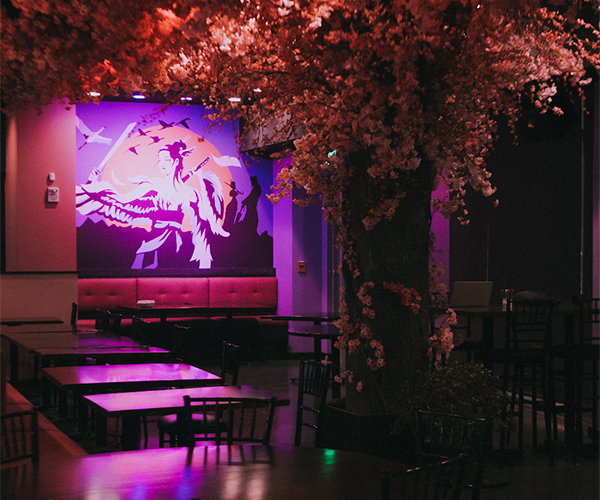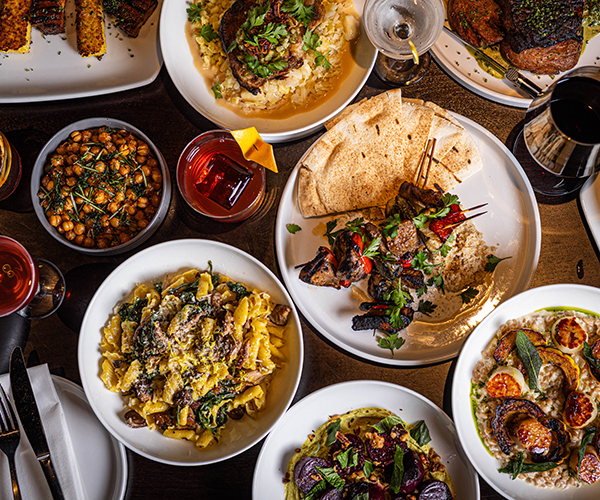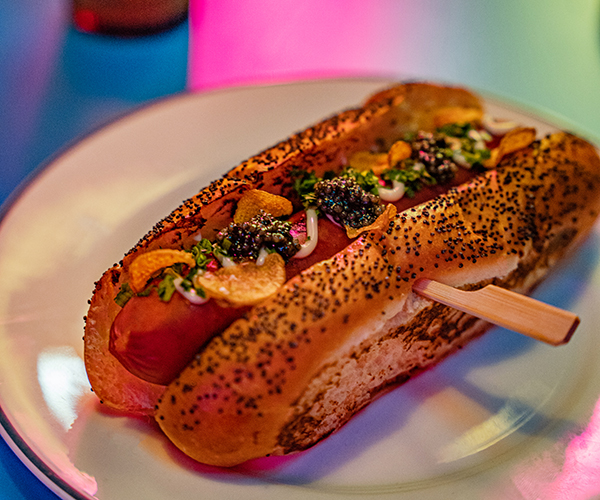chef-owner, Baricelli Inn
Michael Symon
chef-owner, Lola, Lolita, B Spot and Bar Symon
Although they never shared the same kitchen, chefs Paul Minnillo and Michael Symon have shared a deep friendship since 1992. At that time, Symon was an emerging talent at Carl Quagliata’s Piccolo Mondo, and Minnillo was well-established at his Baricelli Inn in Little Italy.
Paul Minnillo / So how long has it been, 18 years?
Michael Symon / Yeah, we met because you and Carl were friends, and it grew from there. I was 22 years old and Carl was a mentor for me, too, but he was more of a restaurateur than a chef. I just hit it off with Paul. I always talked to him, especially when I was getting ready to open my own place. He has always been there for me as a friend, someone I can talk to.
PM / Plus, we shared the same philosophy about food, which is you don’t cut corners. You don’t do shortcuts, and you buy nothing but the best.
MS / And back 18 years, there were maybe only a handful of chefs doing that. So those of us who were just naturally bonded, and I was by far the youngest.
PM / You were in diapers, are you kidding?
MS / But I was always very respectful. I think a lot of the younger guys — my generation and maybe even some of the ones behind us — they didn’t always realize how hard people like you and Carl and Parker [Bosley] worked before us to get this city where it was. The reason we always got along so well was I had a tremendous amount of respect for what you did and always wanted to pick your brain about it and was never afraid to ask questions. I think a lot of the younger guys move back here and just want to turn the city on its ear, and you don’t grow that way.
PM / I always had great respect for Michael, too, and now look at him: He’s a celebrity! He’s done more for the food scene than anyone in the history of Cleveland. But I taught him how to cook.
MS / (Peals of laughter.) I also look to him for the relationships he has built with farmers.
PM / That’s valuable. Like where are you getting your chanterelles and stuff.
MS / I think [locally sourcing] is one of the hardest parts of being a chef. But if I find something really cool, I’ll tell Paul about it and vice versa. It benefits us both, and even more importantly, it helps the farmers. If you hoard those people to yourself, I don’t think it benefits anyone. I never look at it as competition. It’s about building a community. The more great restaurants that open up in Cleveland, the better off we all are.
PM / You’ve done that really well in Tremont.
MS / Sure. The other thing that binds everyone together is that everyone has to work so hard. It’s not an easy business, so there is always this sense that we’re “the crazy people,” the ones who miss the weddings and funerals. So your best friends become the people in the business. And Paulie is one of my best friends. In fact, when Liz and I talked about opening in Tremont 13 years ago, everybody except Paul and Carl said we were crazy, just f---ing morons. But it is so important to be able to talk to someone about these things openly, to be able to ask “What did you do when this happened?” and not pull any punches.
PM / You do lots of soul searching in this business. Mike and I talk about that kind of stuff all the time, like what a great idea the B Spot is. Actually, what I said was, “Why didn’t I think of that?”
MS / (More peals of laughter.) Is he great, or what?
executive chef, Three Birds
chef-owner, Downtown 140
Shawn Monday and Rachel Spieth first met in the kitchen of Three Birds, where they worked together in 2003 and 2004. At the time, Spieth was a pantry cook and Monday was executive sous-chef, assisting executive chef John Kolar while preparing to open his own restaurant, Downtown 140, in Hudson.
Rachel Spieth: Remember? I started working here like a month after the restaurant opened.
Shawn Monday: Yeah, I remember.
RS / It was crazy!
SM / Yeah, we had opened with a kitchen staff of about 20 people, including me and John Kolar, and everyone literally quit within a month, and we had to start all over. One of the people we hired then was Rachel. She was young, but she reminded me a lot of myself when I was her age, aggressive and a go-getter, always taking anything on and going at it. I mean, “mentoring”…
RS / …is a strong word.
SM / Yeah, but over the years she has called me for opinions and menu planning and “how do you do this” and “how do you keep your labor costs in line.” It wasn’t on a day-to-day basis. But any time you work with somebody so many hours in a closed environment, you pick up things from one another.
RS / It was hard when I started, with so many people telling me, “Do this, do this, do this.” It was so busy and hard to bring it together.
SM / Well, when you don’t have your systems down, you don’t know what to expect. You have a big dining room here, with 46 more out on the patio. It can get insane. But once you get those systems in line, after seven years, everything is working out.
RS / And the way they teach you how to do things in school is absolutely not how to do it. They don’t teach you a sense of bulk preparation or how to work as part of a team. It was definitely a hard adjustment for me.
SM / I think the real education starts after culinary school. To think it is over when you get your degree is crazy. You have to know how to work with people; the difference between communicating with your line cooks and the owner; and how to talk to your guests. And then you have to find your own style when it comes to the food.
RS / One thing I never worked with before coming here was [amuse-bouches]. It seemed like something you always did. That was a new concept for me. I found it very interesting. Sauces and soups, too, using combinations of things that I never would have imagined would work together. And I still call on Shawn for help.
SM / And I welcome that call. It means I must have done something right. I never went to culinary school myself, and it feels really good to know I can help train someone who then goes on to a great position at a respected restaurant.
RS / It makes me feel comfortable, too, to know that if I were to have a problem I could call him. Same thing with John Kolar, too. If I ever have a problem, I know I could call them and they would try to help me.
chef-owner, Sergio’s and Sarava
In 1978, Sergio Abramof went to The White House in Mentor to ask for a job. The young cook had no formal training and little experience, but owner Carl Quagliata needed help at Giovanni’s, his 2-year-old place in Beachwood, and hired him. Abramof, who now owns Sergio’s and Sarava, stayed 14 years, learning the ins and outs of fine dining and Northern Italian cuisine.
Sergio Abramof / The first two to three years I was working the line, learning the physical realities. It had an athletic component to it, separate from the culinary part. You have to be able to move, to be fast, to remember.
Carl Quagliata / That’s almost more important than the actual cooking itself.
SA / You had very traditional chefs, and they did stuff the old way. From a culinary side that was wonderful. We were getting whole legs of veal, whole fish. I got a real education on butchering and handling seafood.
CQ / I was a butcher. My father and two brothers were all butchers. We knew meat.
SA / Then the opportunity came up for me to take over the kitchen.
CQ / I got along with you the best of anybody [who ever worked here]. Michael [Symon] — I love him — but we used to argue all the time.
SA / We were extremely busy in those days. Most everyone had five to seven courses. This being roughly a 130-seat restaurant, we’d do 250 people on a Saturday night.
CQ / 270. It was unbelievable.
SA / Doing that volume required quite an intricate system to pull it off.
CQ / It was like being on a ship. To accomplish what we did, it was something.
SA / It was great to see the passion you had as an owner for the guests, that whatever they needed, whatever would make them happy you were going to do. Everybody from the bussers to me, we all felt it. There was no compromise. It instilled in me a respect for what the profession meant. You knew that your guests traveled all over the world and their expectations were extremely high. We weren’t comparing ourselves with other Cleveland restaurants. You’d go to New York, California, Chicago, Italy and come back and say this is what I had, this is the kind of service. Those were inspirational things for me.
CQ / What we used to do back then people don’t want anymore.
SA / The economic climate of the country has changed. In the ’80s, money wasn’t an object. You’d say, “[People] want raspberries.” It’s January or February, and I’d say, “They’re $200 a flat.” You’d say, “Get ’em.”
CQ/ Because customers wanted them.
SA / It was wonderful freedom as a chef to experiment. It was the next best thing to culinary school. You were a great cook and baker, too.
CQ / We fed off each other.
SA / Now I’m an owner. I have to hire chefs. There has to be trust and enough of a connection where you can let go. You have to be able to delegate and still maintain a standard of quality.
CQ / I did that with you. I just let you run the kitchen because you ran it well.
SA / I think that’s what we share on the management side — the ability to transmit to our staff what the expectation is.
CQ / A lot of the young kids today, they cook for themselves. You have to want to please people. It has to come from your heart.
SA / It sounds corny, but it’s the most important thing. You have to want to take care of people.
Annie Chiu
In 1987, Annie Chiu already excelled in the art of traditional Chinese cuisine but was determined to expand her skills into the realm of French cooking. To that end, she sought out Parker Bosley, at the time Cleveland’s best-known French chef and occasional culinary teacher. Although she eventually spent 18 months under Bosley’s tutelage in his restaurant on St. Clair Avenue, Chiu found that getting her foot in the door would be her first challenge.
Annie Chiu / I remember I drove you crazy, trying to get you to teach me. You told me “I’m not teaching right now,” but I kept coming back, knocking at your door, and saying, “Hi, are you going to start teaching yet?” I must have really annoyed you!
Parker Bosley / (Laughs) And finally, I said yes. It wasn’t so much teaching you facts and recipes. It was just “If you work with us, and do what we do, I’ll show you how to do this, and that’s how you will gain knowledge.”
AC / I loved that attitude and the atmosphere of the place. It was serious, not lighthearted — even though we cracked up a lot! Then again, it was part of my culture: Chinese people are very serious.
PB / Well, that’s one of the missing things in our culinary situation in the United States. We don’t have an apprenticeship program. You can do two years at the Culinary Institute of America, but your real education comes when you find a fellow who’s willing to say, “Here, let me show you how to do that.”
AC / I’m going say something some people don’t like to hear: For a young person interested in culinary, finding a mentor is more worth it than just going to vocational school.
PB / Amen.
Cleveland Magazine: What do the two of you share today, in terms of culinary philosophy?
PB / One of the things I like about [Sun Luck Garden] is if I come here, I will not have surprises or shock or disappointment because this is real Chinese food. [Annie’s attitude is] we are not trying to entertain you, we are not trying to shock you. We want things to be cooked properly, the seasonings to be balanced, and the food is always the most important thing. And I don’t think that is true in most restaurants today.
AC / Some people come in here and are surprised I do fried rice. But I don’t care what it is — American-Chinese food, traditional Chinese food — you treat the ingredients right, and it is great.
PB / That’s right. Whether I am making burgers or Chinese food or whatever, I always make my food with respect for the ingredients and an understanding that someone is going to eat this and I want them to have a really good experience. You make it, and you care, and it is right, and then it is good.
AC / It can be egg foo yong or really fancy pressed duck. If you treat it honestly and with integrity, it will be good. I learned that from my uncle, who was a great chef in the northeast of China. He taught me: Don’t worry about flair and drama, just be sure to learn the basics. So I did know that before I met you, so I didn’t give you a hard time that way, did I?
PB / Not at all.
AC / My knowledge from books was good, but I felt like what I read is theoretical. I wanted practical. I wanted the feel of a French kitchen. And that’s what I got from you.
PB / Well, it helped me, too. It’s like from Anna and the King of Siam. Anna says when you become a teacher, your students teach you. When you teach, you have to explain things, which constantly reminds you of the skills you need to keep polished.



